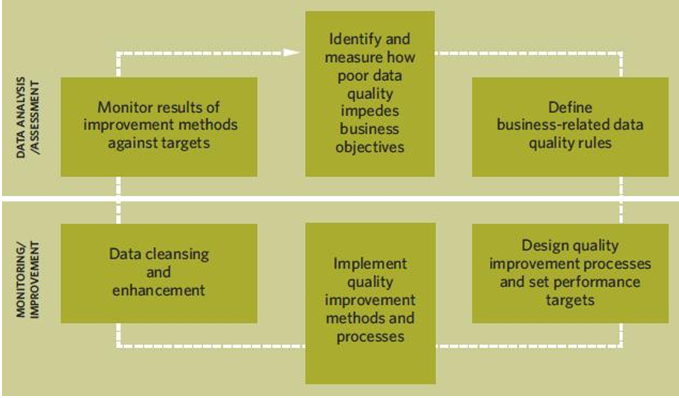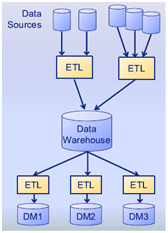Data Utility is nothing but usefulness of data. To improve Data Utility the data has to be:
- Ease to Use
- Accessed
- Understood
- Conforms to standard
- Relevant
- Trusted
- Accurate
- Consistant
- Complete
- Non-duplicate
- Available
- Timely
- Secured
Unmanaged data creates inefficiencies and blockages in organisation's activities. Data Quality Management (DQM) and Data Governance (DG) activities and practices are undertaken to ensure availability, security, reliability, integrity and usability of corporate data to meet its needs around strategy, structure, objectives and organizational alignment.
Data Quality (DQ) is the state of accuracy, consistency, completeness, validity and timeliness of the data that makes it appropriate for a specific use. Data Quality Management (DQM) process shown below, ensures that the data is defect free, conform to specifications, suited to purpose, and meet needs and expectations. Data Quality Audit (DQA) often overlooked by many organizations is critical as it helps to operate on data that is supposed to correctly represent the real-world construct to which they refer.

DiKube Benefit: We offer the following DQM services:
- Data Profiling to Understand the characteristics of the data.
- Data Quality Assessment to Describe (Build, Execute, fine-tune the DQ Rules) and Measure (Report) the quality of the data.
- Data Cleansing to Improve the quality of data - plan, prepare and develop initial cleansing and scheduled cleansing of data.
Data is an organisation's asset, Data Governance enables the organisation to make more efficient use of the available data. The set of processes to formally manage data throughout an enterprise is Data Governance. Data governance necessitates information policies that reflect business needs and expectations, along with the processes for monitoring conformance to those information policies
It helps to ensure that the data can be trusted and that people can be made accountable for any adverse event that happens because of low data quality. Data governance is also critical in managing risk and meeting regulatory compliances.
Data governance is expected to ensure that the data meets the expectations of all the business purposes, in the context of data stewardship, ownership, compliance, privacy, security, data risks, data sensitivity, metadata management, and Master Data Management (MDM). In the process, it brings together people, process and lines of business and leverages technology as its enabler.
We offer following Data Governance services:
- Standardize data definitions
- Prioritize the need for formal policy, standards, or data-related requirements
- Write policy, standards, or data-related requirements
- Write business rules to address the applicability of policy, standards, or requirements
- Report status for policy enforcement initiatives
- Identify stakeholders, establish decision rights, clarify accountabilities
- Meet compliance requirement of regulatory law

